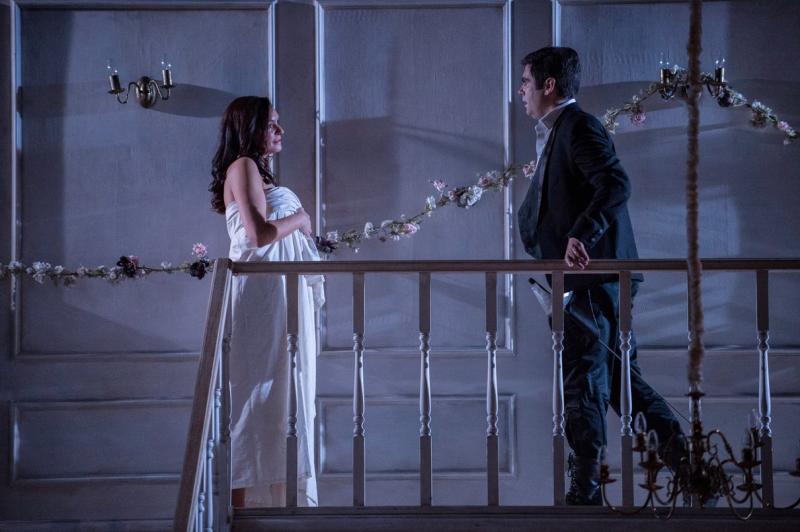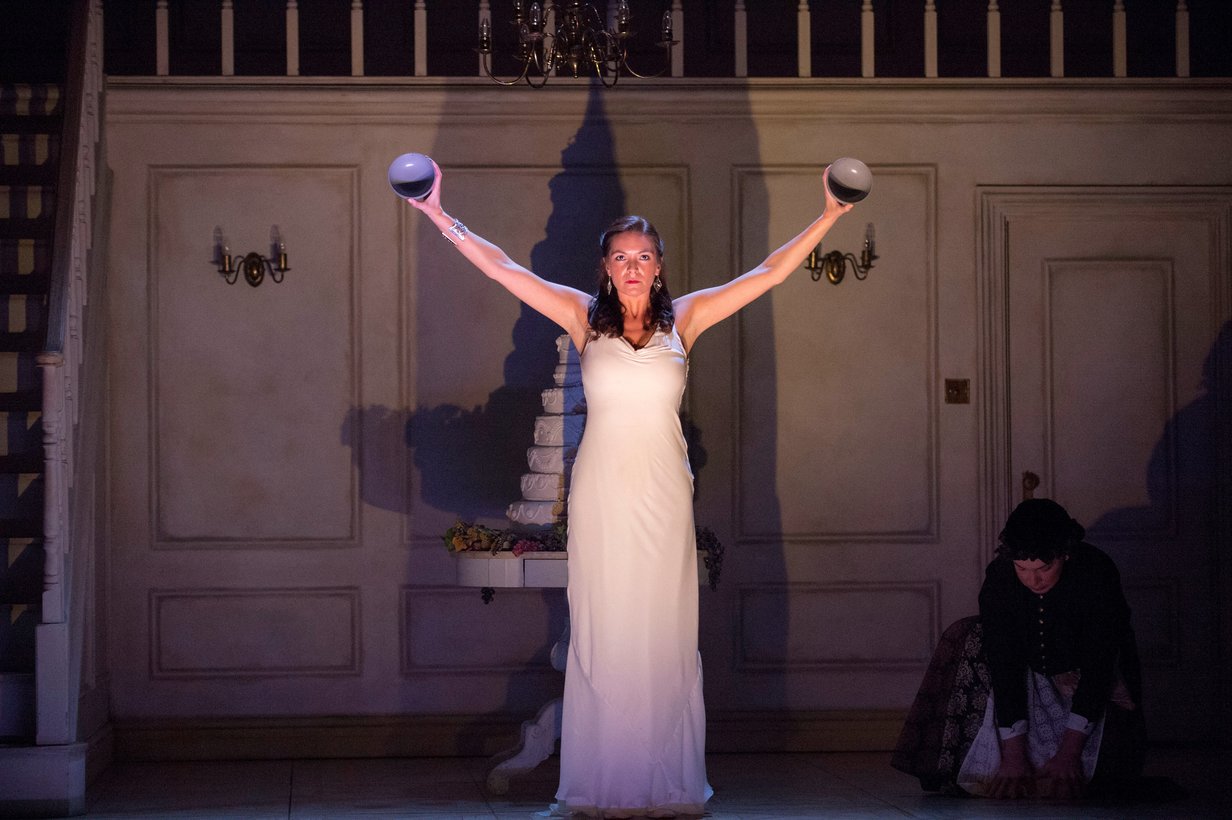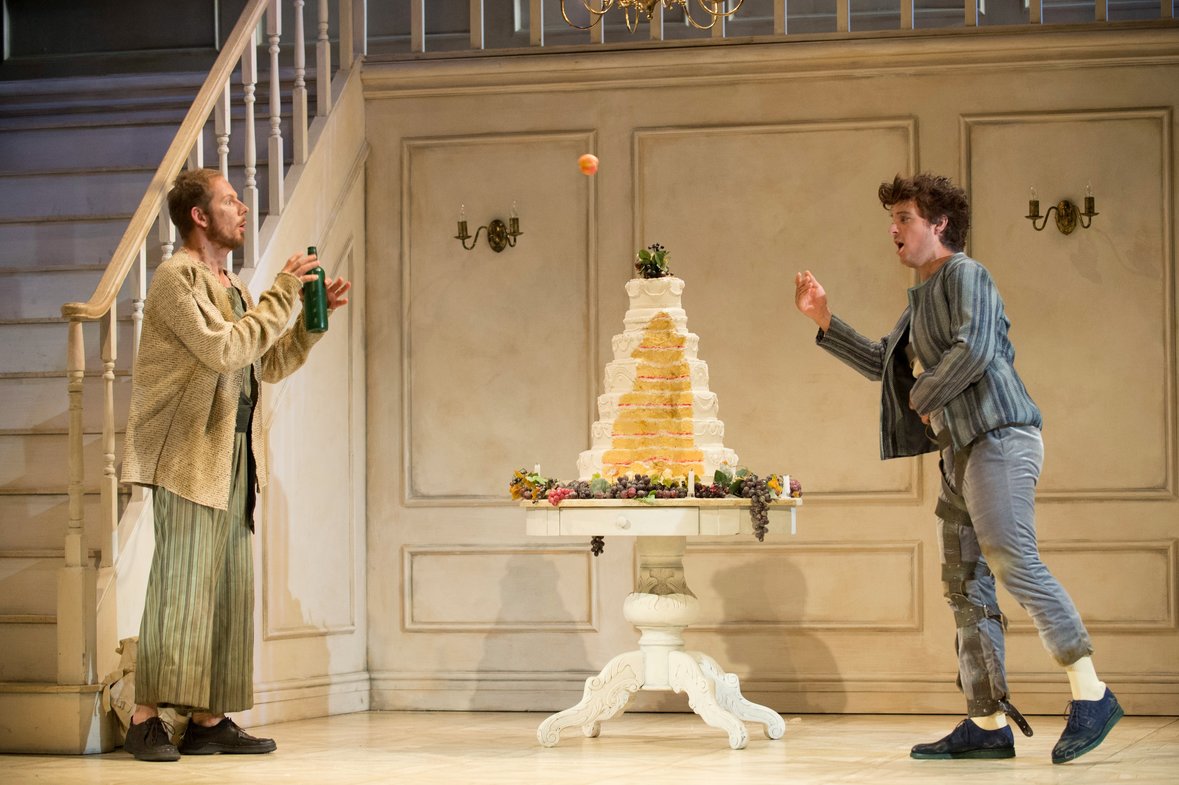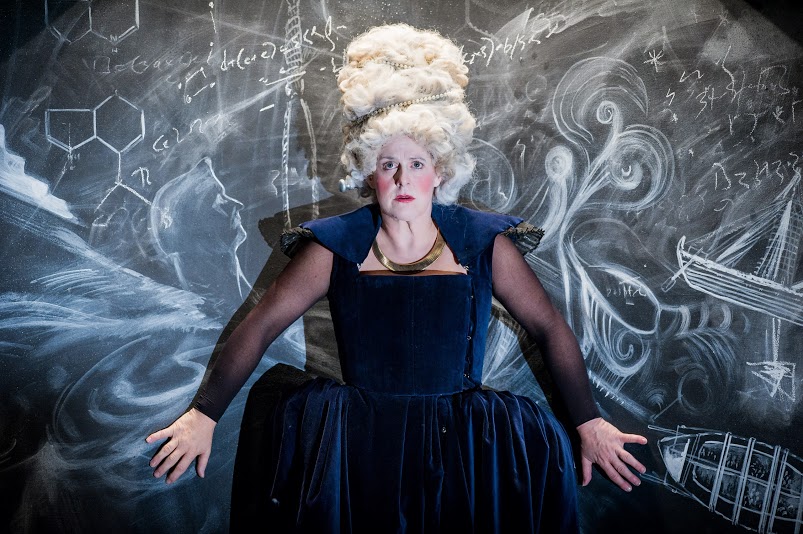Jason/Agrippina, English Touring Opera | reviews, news & interviews
Jason/Agrippina, English Touring Opera
Jason/Agrippina, English Touring Opera
A mixed bag of baroque from English Touring Opera

English Touring Opera has form when it comes to baroque opera. Handelfest in 2009 marked the composer’s 250th anniversary with a sequence of excellent stagings, while 2010’s The Duenna was a riotous and irreverent musical delight, and there was an Alcina back in 2005 that still sticks in the memory for all the right reasons.
So a season of three period productions – Monteverdi’s L’incoronazione di Poppea, Cavalli’s Jason and Handel’s Agrippina – promised much. Some careful repertoire choices, deft direction, and the added enticement of a return to the Royal College of Music’s intimate Britten Theatre all played their part, but performances themselves proved oddly uneven.
Music and mood can turn on a dime, without having to lug an extended da capo behind them
Even by baroque’s baggy standards Cavalli’s Jason is a monster, and demands significant cuts to streamline it for a contemporary audience. Ronald Eyre’s performing edition is brutally efficient, bringing proceedings down to a brisk just-over-an-hour for each half. Inevitably this means that characters and encounters are jettisoned. Three acts become two and Jason’s wife Isiphile, for example, doesn’t make an appearance until the second. It’s a deferral that actually heightens dramatic tension nicely, creating an elegant balance between the mirror halves of the opera – the first at Colchis with Medea and the second on Lemnos where the philandering Jason is reunited with his wife.
Director Ted Huffman places us in an uncomplicated no-time, no-place, framed with elegant simplicity by Samal Blak’s sets – a faintly Baltic blend of Gustavian style and gentle off-whites. In Hannah Pedley’s Medea we also have a heroine who is also decidedly off-white, but this retelling of the tale places less blame with her as magical seductress than with Jason himself (Clint van der Linde). The plot is freely adapted from mythology, offering an unusually domestic take on a tale of heroism that generally favours battles over romance.
 Cavalli’s uniquely flexible and chromatically-infused arioso style is well suited to a drama that slips constantly between joy, high comedy and tragedy. Music and mood can turn on a dime, without having to lug an extended da capo behind them, and when it does break into aria – tiny, simple melodies – the effect is disarmingly effective. Dance permeates the writing and thanks to the athletic (if occasionally rather approximate) work of the Old Street Band under Joseph McHardy, it swings and snaps with percussive energy.
Cavalli’s uniquely flexible and chromatically-infused arioso style is well suited to a drama that slips constantly between joy, high comedy and tragedy. Music and mood can turn on a dime, without having to lug an extended da capo behind them, and when it does break into aria – tiny, simple melodies – the effect is disarmingly effective. Dance permeates the writing and thanks to the athletic (if occasionally rather approximate) work of the Old Street Band under Joseph McHardy, it swings and snaps with percussive energy.
The score is hero here, carrying some rather uneven singing through an evening that charms more than it impresses vocally. Pedley’s Medea (pictured above) is seductive and competently delivered, but occasionally sits just under the note, curdling the sweetness of her blandishments. An ailing van der Linde failed on opening night to relish Cavalli’s swooning arcs of melody, offering a strangely muted performance in which he was dwarfed by both his rival women. Catrine Kirkman’s Isiphile was sweetly sung, never over-weighting the composer’s delicate lines, while a surprisingly tender Delfa from Michal Czerniawski, a cleanly comic Orestes (Piotr Lempa, pictured below with Peter Aisher) and a stand-in Demus (Aisher, stuttering wonderfully) rounded out a true ensemble cast.
Agrippina is up there with Handel’s most melodious scores, and with a plot more cynical than most makes a natural fit for a contemporary audience sick of sudden repentances and deathbed conversions. Led by Gillian Webster’s Agrippina, the cast plotted and schemed their way through intrigue after intrigue under James Conway’s intelligent direction. Blak’s designs offered their own share of wryness, jostling for our attention with some of the foreground interplay.
 Webster (pictured below) is supremely good – a joyous flourish of coloratura and focused tone, shrugging off da capo embellishments with careless ease. Did we truly believe her as an evil Machiavel? Not a bit of it, but luckily Handel’s story doesn’t take us through to Agrippina’s bloody endgame. Paula Sides makes for a minxy Poppea, more assured dramatically than vocally, despite having to contend with the limp van der Linde as lover Ottone. Any energy lacked by van der Linde was more than supplemented by Jake Arditti’s manic Nerone however – ferociously camp and hurling runs at us with desperate intensity.
Webster (pictured below) is supremely good – a joyous flourish of coloratura and focused tone, shrugging off da capo embellishments with careless ease. Did we truly believe her as an evil Machiavel? Not a bit of it, but luckily Handel’s story doesn’t take us through to Agrippina’s bloody endgame. Paula Sides makes for a minxy Poppea, more assured dramatically than vocally, despite having to contend with the limp van der Linde as lover Ottone. Any energy lacked by van der Linde was more than supplemented by Jake Arditti’s manic Nerone however – ferociously camp and hurling runs at us with desperate intensity.
 Jonathan Peter Kenny certainly wasn’t hanging about with the tempos. Ranging from brisk to breakneck, some sections fared better than others. The overture was a joy, and the closing dance, but to take “Vaghe fonti” at a canter is to lose the throbbing intensity of its rhythms and suggestive wind writhings. And as for Claudio’s gorgeous little cavatina “Viena O Cara” – it may be sung by a buffoon in determined seduction, but it deserves just a little more indulgence and phrasing than Kenny or Andrew Slater afforded it. Slips of intonation and ensemble from the Old Street Band didn’t help matters, but surely these details will settle as the run progresses.
Jonathan Peter Kenny certainly wasn’t hanging about with the tempos. Ranging from brisk to breakneck, some sections fared better than others. The overture was a joy, and the closing dance, but to take “Vaghe fonti” at a canter is to lose the throbbing intensity of its rhythms and suggestive wind writhings. And as for Claudio’s gorgeous little cavatina “Viena O Cara” – it may be sung by a buffoon in determined seduction, but it deserves just a little more indulgence and phrasing than Kenny or Andrew Slater afforded it. Slips of intonation and ensemble from the Old Street Band didn’t help matters, but surely these details will settle as the run progresses.
Two mixed evenings then, but despite smudges and the odd bit of miscasting both ETO’s productions leave their mark in a sense of ebullient energy. You feel very well entertained on leaving the theatre, and isn’t that what it’s all about? Herr Handel would doubtless have had some stern words, but free from his reproving gaze the rest of us can get on with having a good time.
English Touring Opera's Jason and Agrippina tour the UK until 24 November, 2013
rating
Explore topics
Share this article
The future of Arts Journalism
You can stop theartsdesk.com closing!
We urgently need financing to survive. Our fundraising drive has thus far raised £49,000 but we need to reach £100,000 or we will be forced to close. Please contribute here: https://gofund.me/c3f6033d
And if you can forward this information to anyone who might assist, we’d be grateful.

Subscribe to theartsdesk.com
Thank you for continuing to read our work on theartsdesk.com. For unlimited access to every article in its entirety, including our archive of more than 15,000 pieces, we're asking for £5 per month or £40 per year. We feel it's a very good deal, and hope you do too.
To take a subscription now simply click here.
And if you're looking for that extra gift for a friend or family member, why not treat them to a theartsdesk.com gift subscription?
more Opera
 Albert Herring, English National Opera review - a great comedy with depths fully realised
Britten’s delight was never made for the Coliseum, but it works on its first outing there
Albert Herring, English National Opera review - a great comedy with depths fully realised
Britten’s delight was never made for the Coliseum, but it works on its first outing there
 Carmen, English National Opera review - not quite dangerous
Hopes for Niamh O’Sullivan only partly fulfilled, though much good singing throughout
Carmen, English National Opera review - not quite dangerous
Hopes for Niamh O’Sullivan only partly fulfilled, though much good singing throughout
 Giustino, Linbury Theatre review - a stylish account of a slight opera
Gods, mortals and monsters do battle in Handel's charming drama
Giustino, Linbury Theatre review - a stylish account of a slight opera
Gods, mortals and monsters do battle in Handel's charming drama
 Susanna, Opera North review - hybrid staging of a Handel oratorio
Dance and signing complement outstanding singing in a story of virtue rewarded
Susanna, Opera North review - hybrid staging of a Handel oratorio
Dance and signing complement outstanding singing in a story of virtue rewarded
 Ariodante, Opéra Garnier, Paris review - a blast of Baroque beauty
A near-perfect night at the opera
Ariodante, Opéra Garnier, Paris review - a blast of Baroque beauty
A near-perfect night at the opera
 Cinderella/La Cenerentola, English National Opera review - the truth behind the tinsel
Appealing performances cut through hyperactive stagecraft
Cinderella/La Cenerentola, English National Opera review - the truth behind the tinsel
Appealing performances cut through hyperactive stagecraft
 Tosca, Royal Opera review - Ailyn Pérez steps in as the most vivid of divas
Jakub Hrůša’s multicoloured Puccini last night found a soprano to match
Tosca, Royal Opera review - Ailyn Pérez steps in as the most vivid of divas
Jakub Hrůša’s multicoloured Puccini last night found a soprano to match
 Tosca, Welsh National Opera review - a great company reduced to brilliance
The old warhorse made special by the basics
Tosca, Welsh National Opera review - a great company reduced to brilliance
The old warhorse made special by the basics
 BBC Proms: The Marriage of Figaro, Glyndebourne Festival review - merriment and menace
Strong Proms transfer for a robust and affecting show
BBC Proms: The Marriage of Figaro, Glyndebourne Festival review - merriment and menace
Strong Proms transfer for a robust and affecting show
 BBC Proms: Suor Angelica, LSO, Pappano review - earthly passion, heavenly grief
A Sister to remember blesses Puccini's convent tragedy
BBC Proms: Suor Angelica, LSO, Pappano review - earthly passion, heavenly grief
A Sister to remember blesses Puccini's convent tragedy
 Orpheus and Eurydice, Opera Queensland/SCO, Edinburgh International Festival 2025 review - dazzling, but distracting
Eye-popping acrobatics don’t always assist in Gluck’s quest for operatic truth
Orpheus and Eurydice, Opera Queensland/SCO, Edinburgh International Festival 2025 review - dazzling, but distracting
Eye-popping acrobatics don’t always assist in Gluck’s quest for operatic truth
 MARS, Irish National Opera review - silly space oddity with fun stretches
Cast, orchestra and production give Jennifer Walshe’s bold collage their all
MARS, Irish National Opera review - silly space oddity with fun stretches
Cast, orchestra and production give Jennifer Walshe’s bold collage their all

Add comment